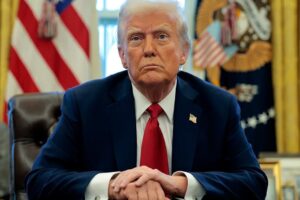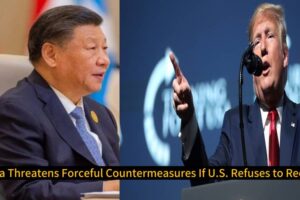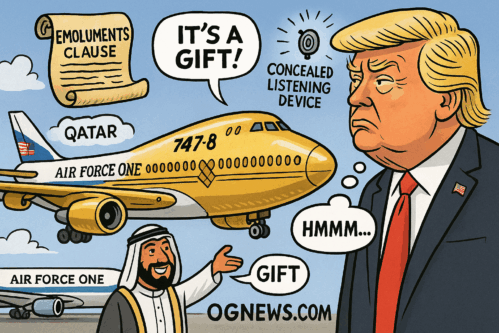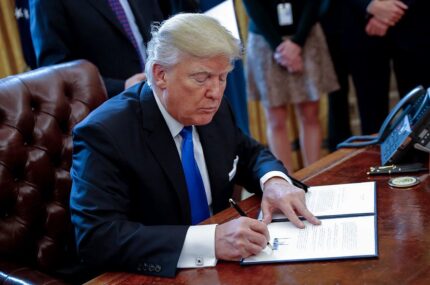The President Considers Making Qatari Jet Gift a Temporary Air Force One
San Antonio, TX — A luxury Boeing 747-8 jet formerly used by the Qatari royal family and now parked in Texas may soon become one of the most controversial aircrafts in U.S. history. According to The Houston Chronicle, the plane — now stationed at San Antonio International Airport — could be retrofitted as a temporary Air Force One for former President Donald Trump, should he return to office. The aircraft, valued at approximately $400 million, is being prepared by L3Harris Technologies, a U.S. defense contractor based in Melbourne, Florida.
The Qatari Jet Gift, bearing registration P4-HBJ, was reportedly offered to Trump earlier this year and could soon be transformed into a symbol of both executive power and constitutional debate. However, the optics and legality surrounding its potential use have ignited a firestorm of controversy — one that stretches from the tarmac in Texas to the halls of Congress.
A Constitutional Quagmire: The Emoluments Clause and Presidential Gifts
At the center of the storm is the U.S. Constitution’s Emoluments Clause, which bars federal officials from accepting gifts or favors from foreign governments without Congressional approval. Legal analysts warn that Trump’s use of the Qatari Jet Gift — even if only temporarily — may violate this clause. Though Trump’s legal team insists the aircraft will be transferred to his presidential library post-tenure, critics are unconvinced.
“It’s a legal gray zone, but the red flags are hard to ignore,” said constitutional scholar Dr. Leah Marshall of Georgetown University. “If the jet is gifted or loaned without full transparency and Congressional oversight, it could constitute a breach of federal ethics laws.”
Some even argue that the transaction could be construed as bribery or influence-peddling, particularly in light of Trump’s past dealings with Gulf nations. During his presidency, Trump faced repeated scrutiny over unreported foreign gifts and questionable business ties abroad — many of which were later deemed ethically murky or outright improper.
Qatar Responds: No Final Deal, Just Ongoing Talks
In an official statement, Qatar’s Media Attaché to the United States, Ali Al-Ansari, denied any finalized donation of the aircraft. He clarified that discussions are still underway between Qatar’s Ministry of Defense and the U.S. Department of Defense regarding the potential use of the jet.
“There has been no agreement, no finalized deal,” Al-Ansari emphasized. “Speculation about an announcement during Mr. Trump’s possible Middle East trip is premature.”
The denial raises further questions about the nature of the Qatari Jet Gift’s arrival in Texas and its current status. If the aircraft is not yet officially transferred, what legal mechanisms allowed it to enter the U.S. and begin retrofitting under a private defense contractor?
Flying Palace or Trojan Horse? Security Concerns of Accepting the Qatari Jet Gift
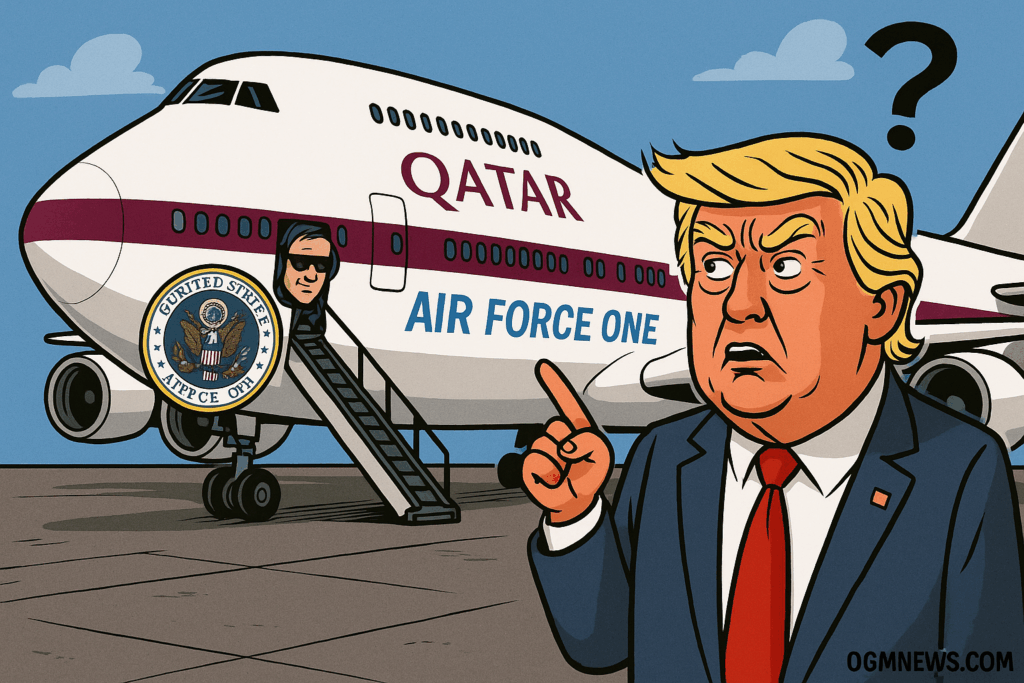
National security experts are sounding alarms over the risks of using a foreign aircraft for presidential travel — no matter how luxurious it may appear. Some fear the jet could be compromised with surveillance devices or embedded espionage technology. One retired NSA official warned that accepting such a plane could create a serious intelligence vulnerability.
“This isn’t paranoia — it’s history,” said Col. Eric Malden (Ret.), referencing the infamous 1945 incident in which the Soviet Union gifted the U.S. ambassador a carving of the Great Seal embedded with a covert listening device. The bug was undetected for seven years.
“This Qatari Jet Gift could be a 400-million-dollar listening device. You can’t just repaint it and slap a flag on the tail,” Malden added. Given that Trump’s communications would be of high interest to foreign intelligence agencies, the aircraft would need to undergo the most rigorous security screening in modern aviation history.
Boeing Delays Open Door for Foreign Substitutes
Trump’s consideration of the Qatari Jet Gift stems, in part, from delays in Boeing’s development of the new VC-25B — the designated replacement for the aging VC-25A aircraft that currently serve as Air Force One. Originally projected for delivery by 2024, the first VC-25B is now delayed until 2027, with a second unit expected in 2028.
The delays, blamed on pandemic-era disruptions, cost overruns, and contractor disputes, have left a gap that Trump — or any president — may need to fill temporarily. That void has created an opening for unconventional options, but also for unconventional controversy.
“Optics matter,” said aviation analyst Karen Blevins. “Even if the Qatari jet is safe, the symbolism of a foreign jet flying the American president is politically combustible.”
Political Fallout: Critics Slam Ethics, Influence, and Optics of the Qatari Jet Gift
Reactions from Capitol Hill have been swift. Senate Minority Leader Chuck Schumer called the move “an affront to the Constitution and a disgrace to the presidency,” while Rep. Adam Schiff warned of potential influence peddling, especially in light of past business collaborations between Trump and Qatar.
Indeed, the Trump Organization has previously explored projects with Qatari investors, including a stalled luxury golf resort. Critics argue that accepting the Qatari Jet Gift — even indirectly — could appear as a quid pro quo and raise questions about loyalty and transparency.
“The American people deserve a commander-in-chief who puts country over convenience,” Schiff said.
Qatari Jet Gift Set or Constitutional Threat?
As of now, the Qatari Boeing 747-8 sits quietly in San Antonio, cloaked in legal ambiguity and political scrutiny. Whether it ever takes flight as Air Force One may depend not only on retrofitting and defense protocols but also on the strength of America’s democratic institutions and public trust.
Until then, the question remains: Will this aircraft represent innovation and pragmatism — or a violation of law and precedent?




